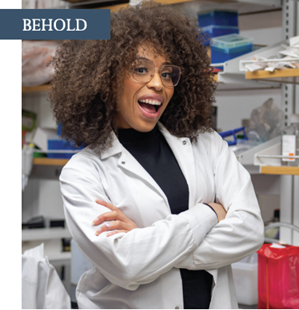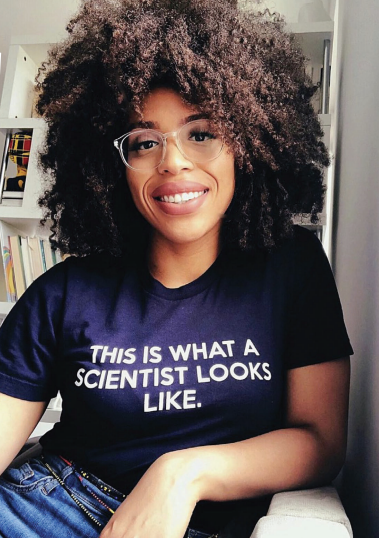 Even though the popular film “Hidden Figures” featured smart, strong Black women blazing trails a generation ago at NASA’s Hampton, Virginia, facility, today’s image of a scientist is still likely to be one of an “old white guy” in a lab coat. And that’s what Korie Grayson, Ph.D., (B.S. ’12), biomedical engineer and chemical engineering researcher, wants to change. The attractive 31-year-old Black woman, who listens to R&B and Afrobeat music and describes herself as a foodie, a wine enthusiast and a workout junkie, is just one example of what a scientist is today.
Even though the popular film “Hidden Figures” featured smart, strong Black women blazing trails a generation ago at NASA’s Hampton, Virginia, facility, today’s image of a scientist is still likely to be one of an “old white guy” in a lab coat. And that’s what Korie Grayson, Ph.D., (B.S. ’12), biomedical engineer and chemical engineering researcher, wants to change. The attractive 31-year-old Black woman, who listens to R&B and Afrobeat music and describes herself as a foodie, a wine enthusiast and a workout junkie, is just one example of what a scientist is today.
“I’m helping to redefine the image of STEM (Science, Technology, Engineering and Mathematics) by showing what the average scientist looks like and where she comes from,” she says. “I want to be a disrupting force. Just knowing that I can have that impact in my community allows the next person or the next generation to see that they can do it, too.” While they have made great contributions in STEM fields, women — especially women of color — are still underrepresented.
According to the National Science Board, women today comprise 47% of the workforce but only 28% of the science and engineering workforce. Of this percentage, only 5% are women of color. Scientific American says that 45% of women in STEM leave their positions because they feel underpaid and underrepresented. A first-generation college student, Grayson, a “military brat” who grew up all over the country, graduated from Maury High School in Norfolk.
 She was accepted into all 14 universities to which she applied, but Norfolk State offered her a full-ride scholarship into the Dozoretz National Institute for Mathematics and Applied Sciences (DNIMAS) program. “When I went on a tour with Dr. (Aliecia) McClain, the DNIMAS program director, my mom felt good about sending me where somebody would not only be a kind of parental figure, but also keep me on track with my grades.” Norfolk State was the right choice for her.
She was accepted into all 14 universities to which she applied, but Norfolk State offered her a full-ride scholarship into the Dozoretz National Institute for Mathematics and Applied Sciences (DNIMAS) program. “When I went on a tour with Dr. (Aliecia) McClain, the DNIMAS program director, my mom felt good about sending me where somebody would not only be a kind of parental figure, but also keep me on track with my grades.” Norfolk State was the right choice for her.
“I was surrounded by people who looked like me and could relate to me as a first-generation college student and the child in a single-parent household. You’re surrounded by professors — even the custodial staff — who are cheering you on. It gave me the confidence that I could succeed.” And succeed she has. After graduating with her chemistry/pre-med degree, she worked for two years plotting her next step after deciding that medical school was not for her.
She eventually landed a job at a biomedical device company assembling a product for dialysis patients. Because of her experience there she decided that she wanted to pursue graduate studies and was accepted into Cornell University’s Biomedical Engineering doctoral program. At Cornell, she became the Louis Stokes Alliance for Minority Participation (LSAMP)
Graduate Coordinator in the Diversity Programs in Engineering (DPE) Department, a job supporting the recruitment and retention of underrepresented students. She was also a graduate resident fellow, living and working with undergraduates in student housing to foster a diverse community. In 2020 Grayson successfully defended her doctoral dissertation that evaluated cancer drug resistance in late-stage prostate cancer.
She is now a postdoctoral research fellow at the University of Michigan in the Department of Chemical Engineering. Her research focuses on evaluating novel nano- and microparticles for therapy in acute inflammatory disease and cancer. The aim of her research is to develop treatments that more effectively target and kill harmful cells without damaging good cells. But Grayson’s work doesn’t stop in the lab. She is a leader in many professional associations and has received a long list of honors and awards.
Additionally, she speaks to elementary, high school, college and graduate students, as well as to nonprofits, Fortune 500 companies and public institutions about her STEM journey, research, science communication and self-advocacy. “Self-advocacy is one of my favorite talks, because I do it for women in positions where they are the minority and experiencing things they shouldn’t have to deal with,” she says. She was inspired to pursue this topic by a lab partner in grad school who often didn’t stand up for herself.
“I thought, there’s got to be a way to relay to women that they can be assertive without coming off as aggressive.” She says there are three pillars for self-advocacy: Knowing yourself, knowing your needs and values, and knowing how to get your needs met. “I try to give people the skills and tools to build their confidence and to learn to negotiate in a job or for a raise.” Her robust online presence includes a comprehensive website that details her accomplishments, research and speaking topics. Her social media activities have included a dance on TicTok that went viral and was aired on BET.
She says making herself visible online is one of her strategies for promoting diversity in STEM. “Being on social media posting about my life and presenting different images inside and outside of the lab shows that scientists have lives. We’ve got tattoos. We’ve got piercings. We travel. We like wine . . . we’re other things than just our jobs.”